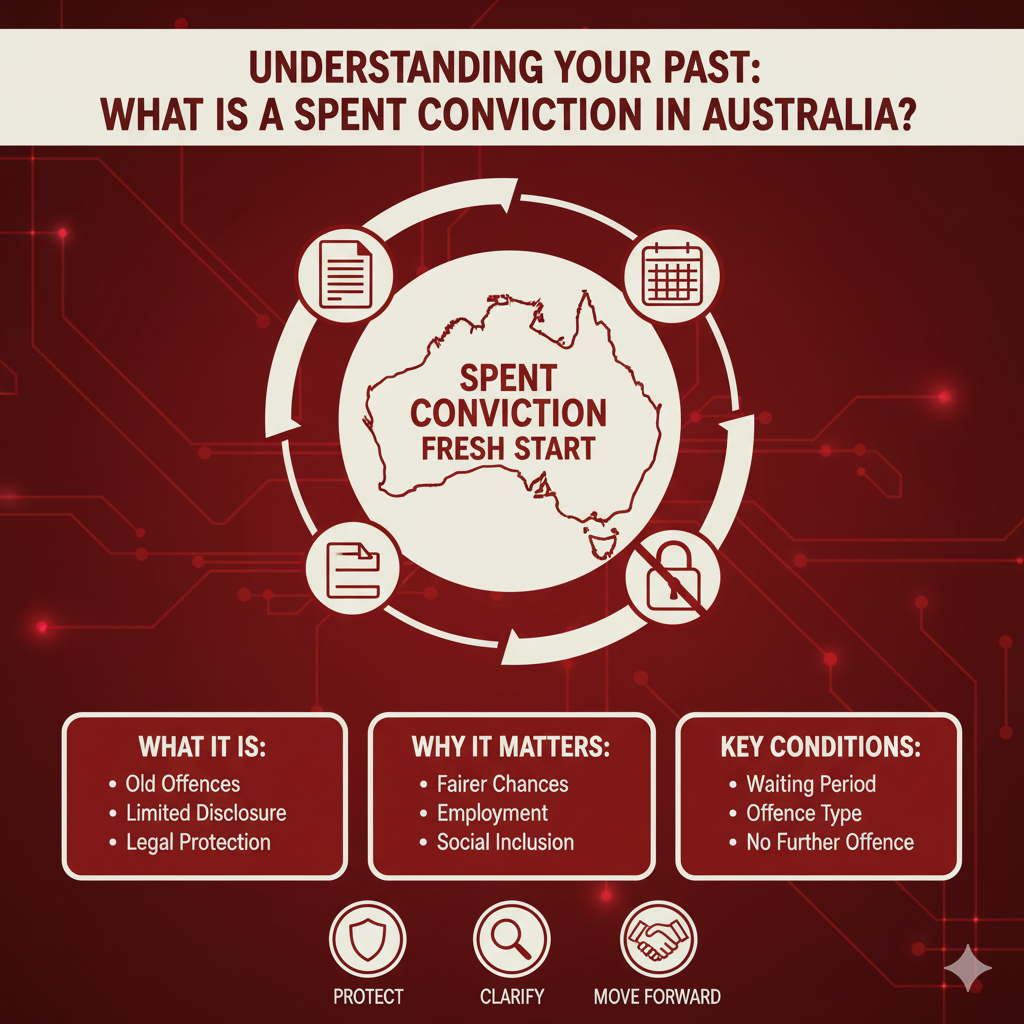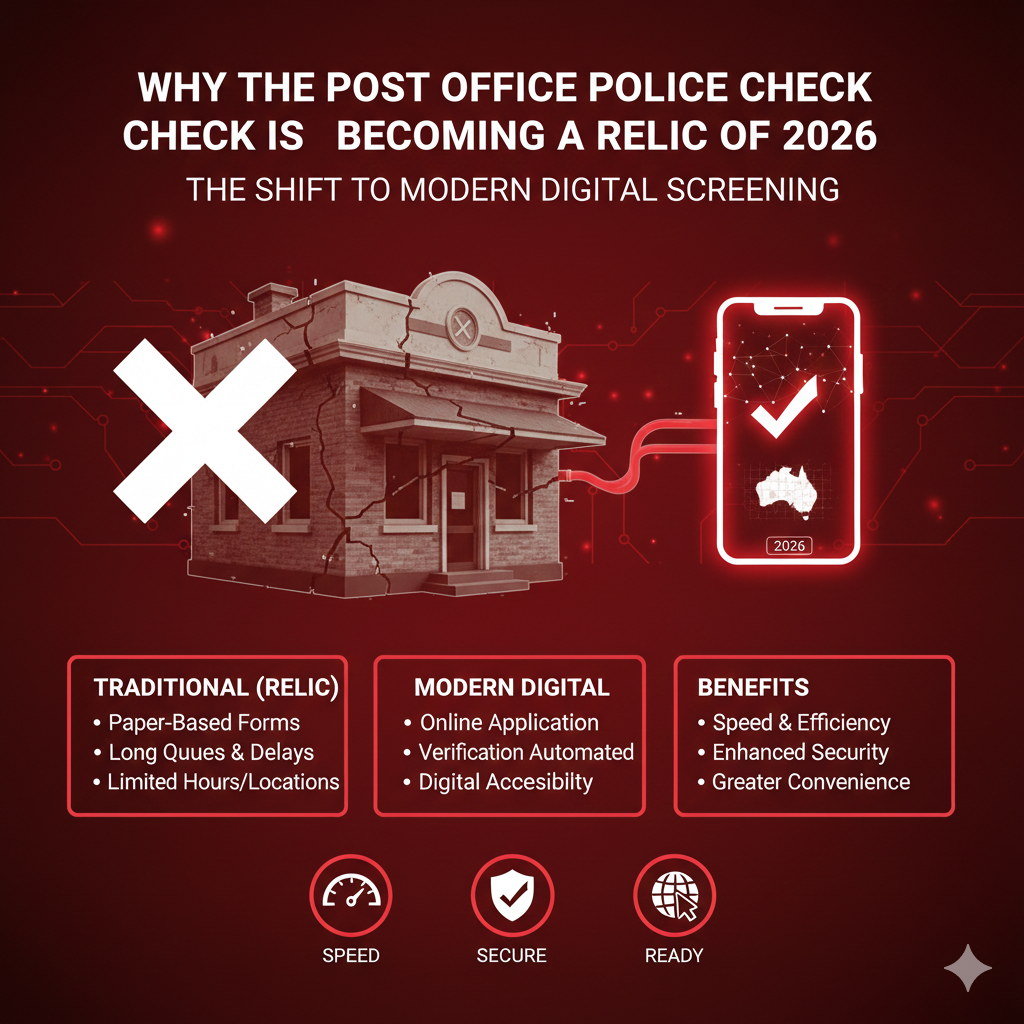A criminal record frequently creates needless obstacles even after an obligation to society has been settled, making it feel like a life sentence. The Australian legal system introduced the Spent Convictions Scheme in recognition of this. This crucial foundation is intended to support rehabilitation and reintegration, guaranteeing that an individual is not consistently punished for past, small errors.
Understanding what constitutes a spent conviction in Australia is crucial whether you’re seeking for a job, volunteering, or just want to know your rights surrounding your criminal history.
At Rapid Screening, we issue the official Nationally Coordinated Criminal History Check (NCCHC), and our results automatically reflect the application of Spent Convictions laws. This guide breaks down this complex area, explaining how a conviction becomes ‘spent’ and when it can still be disclosed.
The Spent Convictions Scheme Defined
What is a spent conviction in Australia? It is a criminal conviction that, after a specified period of good behaviour, is removed from a person’s disclosable criminal record for most purposes.
The Core Principle: Rehabilitation and Non Disclosure
The primary goal of the scheme, established under the Crimes Act 1914 (Cth) and mirrored in State and Territory legislation, is to grant a right of non disclosure.
- Right of Non Disclosure: Once a conviction is spent, you are not legally required to disclose the conviction to most employers, organisations, or individuals. Furthermore, it is generally unlawful for an authorised agency to disclose it on a police check.
- Not Erased: It’s important to understand that the conviction is not erased from police records; it is simply prevented from being disclosed for general purposes. Police and intelligence agencies retain full access to all records.
The system works automatically: when a police check is processed, the police agencies apply the relevant Spent Convictions criteria to all records before issuing the final certificate.
How a Conviction Becomes Spent
For a conviction to be recognized as spent under the Commonwealth scheme (which broadly covers federal and some national offences), it must meet a tight set of conditions, primarily revolving around the gravity of the offence and a period of crime free behaviour.
Key Criteria for a Conviction to be Spent
The conditions vary slightly across Australia’s jurisdictions, but the following table summarises the general national requirements for a conviction to become spent:
| Criterion | Adult Offender (Aged 18+) | Juvenile Offender (Aged under 18) |
| Prison Sentence | Cannot have been sentenced to imprisonment for more than 30 months. | Cannot have been sentenced to imprisonment for more than 30 months (or equivalent detention). |
| Crime Free Waiting Period | 10 years must have passed since the conviction. | 5 years must have passed since the conviction. |
| Behaviour | The person must have committed no further offences during the waiting period. | The person must have committed no further offences during the waiting period. |
If these conditions are met, the conviction is automatically treated as spent and will typically not appear on your Nationally Coordinated Criminal History Check (NCCHC).
Offences That Can Never Be Spent
Certain serious convictions are permanently excluded from the Spent Convictions Scheme due to the gravity of the crime. These offences will always be disclosed on a police check, regardless of the time elapsed:
- Sexual Offences
- Convictions
The exclusion of these offences acknowledges the principle that, for roles involving vulnerable persons or high public trust, full disclosure is required.
When a Spent Conviction Can Still Be Disclosed
Even if a conviction meets the criteria to be spent, there are statutory exceptions where the information can still be released on a police check. This is critical for sectors where public safety overrides the individual’s right to non disclosure.
Statutory Exemptions for Disclosure
These exemptions are typically linked to specific employment or licensing purposes where an employer has a legal obligation to access a fuller criminal history.
Examples of purposes of what is a spent conviction in Australia, may still be disclosed include:
- Working with Children: Employment or volunteering in child related sectors.
- Vulnerable People: Working in aged care, disability services, or other fields involving vulnerable persons.
- Law Enforcement & Government Security: Roles in police, intelligence agencies, or high level government security clearances.
- Licensing: Applications for specific licences, such as firearms permits or certain accreditation (e.g., taxi, rideshare, or bus driver accreditation).
- Judicial Proceedings: Disclosure is permitted in court and tribunal proceedings.
If you apply for a police check for one of these exempt purposes, you will receive a certificate with a more comprehensive history, as the Spent Convictions Scheme does not apply to that particular check.
The Role of the Police Check Provider
When you apply for a check through Rapid Screening, we are merely the conduit. The actual application of what is a spent conviction in Australia is carried out by the Australian Police Agencies (who manage the NCCHC database) as they process your check.
- The police agency receives your details.
- They search the database for records.
- They check the record against the relevant State/Territory/Commonwealth Spent Convictions laws and the stated purpose of your check.
- Only records deemed legally “Disclosable” are released on the final certificate.
This ensures the process is compliant, fair, and legally sound. Not limiting the checks to TAS or QLD, we provide services in all Australia.
Conclusion
A key component of Australian legislation that strikes a balance between the requirement for public safety and the objective of treatment is the Spent Convictions Scheme. The program makes sure that a previous error does not represent an impassable barrier to work or social involvement by restricting the revelation of relatively small, older offenses.
When you obtain your Nationally Coordinated Criminal History Check through Rapid Screening, you can be confident that the final certificate accurately reflects the legal position regarding your spent convictions. Our efficient service ensures you receive your compliant result quickly (70% in 2 to 4 hours), allowing you to move forward with your career or application with legal clarity.
Frequently Asked Questions (FAQs)
Q1) Do I have to tell an employer about a spent conviction?
In general, no. You are legally entitled to non-disclosure if the sentence you received is expired. Unless the employer falls into an excluded category (such as working with children) and is legally entitled to obtain complete data, it is legal for an employee to deny or not admit the fact of a spent conviction.
Q2) Is the Spent Convictions Scheme the same in every State and Territory?
No, there are differences. Every Australian State and Territory (NSW, Victoria, WA, etc.) has its own unique laws (such as the Spent Convictions Act 2021 in Victoria) with somewhat distinct waiting periods and requirements, even if the Commonwealth Scheme covers federal offenses. Nonetheless, the fundamental tenet of non-disclosure for minor, older offenses is still the same nationwide.
Q3) If my conviction is spent, why would it appear on my police check?
It would only appear if your police check was requested for an exempt purpose (e.g., aged care, working with children, firearms licensing). In these high risk areas, the law dictates that the full criminal history, including spent convictions, must be disclosed to ensure public safety.
Q4) If I am granted a pardon, is that the same as a spent conviction?
No, but the effect is similar. A pardon or a quashed conviction is treated by the system as having the same effect as a spent conviction; it will generally not be disclosed on your police check. However, a pardon is a formal exercise of mercy, whereas a spent conviction is an automatic legal status achieved after a crime free period.




